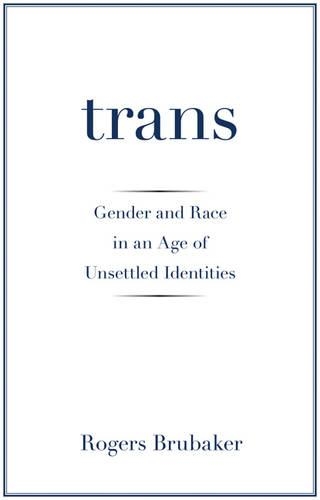
Trans: Gender and Race in an Age of Unsettled Identities
(Hardback)
Available Formats
Publishing Details
Trans: Gender and Race in an Age of Unsettled Identities
By (Author) Rogers Brubaker
Princeton University Press
Princeton University Press
2nd January 2017
United States
Classifications
General
Non Fiction
Ethnic studies / Ethnicity
LGBTQIA+ Studies / topics
305.3
Physical Properties
Hardback
256
Width 140mm, Height 216mm
454g
Description
In the summer of 2015, shortly after Caitlyn Jenner came out as transgender, the NAACP official and political activist Rachel Dolezal was "outed" by her parents as white, touching off a heated debate in the media about the fluidity of gender and race. If Jenner could legitimately identify as a woman, could Dolezal legitimately identify as black Ta
Reviews
"Pacy and stimulating... The nub of Trans's argument is that we are culturally primed to be more receptive to transgender journeys, whether male to female or vice versa, because these are framed as identity or even civil rights issues, whereas racial identities are still categorical."--Marina Benjamin, New Statesman "The value in Brubaker's book is not in readjudicating old internet battles, but in laying out current conflicts of identity in a public, accessible way; academics have been thinking and talking about the fluidity and fixedness of gender and race for a long time, but their thinking hasn't always been part of mainstream conversations. Especially with the growing number of legislative, judicial, and cultural challenges to the role of gender in American society, sometimes, it can just be useful to lay out the terms of debate."--Emma Green, The Atlantic "Lucid, sophisticated, and judicious, Trans is an important and timely exploration of the increasingly uncertain and unsettled boundaries of identity."--Glenn Altschuler, Florida Courier "While the rst part of Trans compares Dolezal and Jenner, the second leverages the concept of transgender to examine transracial differences. Ultimately, Brubaker would like us to recognize transracial identities in the same way we accept transgender ones. In his analysis, transracial identities generate uneasy resonances with not only the dark histories of racial passing, but also the contemporary realities of racial oppression. Still, he prods us to reflect on the new kinds of racial identities being created through interracial relations, multiracial movements and generational change. While the mainstream recognizes transgender, it remains wary of transracial. The controversy over trans identities is far from settled."--Macleans "Brubaker maintains that we are living in 'an age of unsettled identities.' Of that, he convinces me. This book is necessary reading for anyone interested in the categories of identity and how they are being invoked or subverted."--Leonard Curry, Christian Century "This short book packs a wallop. In our era of academic hyper-specialization, where there is an ever-present temptation to bore deeper into a subject, and where identity politics can amplify that tendency by discouraging people from writing about groups they cannot claim to be members of, this comparative analysis of race and gender by a white cisgender man offers up a much-needed, fresh perspective."--Arlene Stein, Public Books "[A] clear-eyed, eye-opening book to see ways in which transracialism may and may not be considered as legitimate as transgenderism in the modern push for fluidity of identity categories."--A. Loudermilk, PopMatters "Brubaker ... one of our finest analysts of the politics of difference, provides a clear and concise guide for the perplexed. He carefully lays out a taxonomy of both older and emerging classifications of 'trans,' ordering both the many meanings of transgender and the less well known and more contested ideas about transracial... What is clear from this excellent book is that the cultural logic of autonomy/choice that is working itself out in our age of unsettled identities is not of itself self-limiting. Wherever it takes us as a society, it seems, we will be forced to go."--Joseph E. Davis, Society
Author Bio
Rogers Brubaker is professor of sociology and UCLA Foundation Chair at the University of California, Los Angeles. His recent books include Ethnicity without Groups, Nationalist Politics and Everyday Ethnicity in a Transylvanian Town, and Grounds for Difference.
